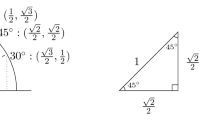Abstract
In this paper we discuss three interrelated questions. First: is explanation in mathematics a topic that philosophers of mathematics can legitimately investigate? Second: are the specific aims that philosophers of mathematical explanation set themselves legitimate? Finally: are the models of explanation developed by philosophers of science useful tools for philosophers of mathematical explanation? We argue that the answer to all these questions is positive. Our views are completely opposite to the views that Mark Zelcer has put forward recently. Throughout this paper, we show why Zelcer’s arguments fail.
Similar content being viewed by others
Notes
Note that we do not claim that “providing understanding” is the only possible extra aim that can be considered. However, it is the possible extra aim that justifies the application of philosophical concepts of explanation to mathematics. There may be other things that mathematicians may aim at, besides proving theorems and providing understanding.
As Zelcer points out, in this case we would probably like to have an explanation of why explanatory considerations, though they are important, are largely absent from mathematics. However, this question does not rise at this moment.
There are interesting contributions to the literature which do not fit into any of our two approaches because they focus on specific types of proofs and/or are do not propose models of mathematical explanation. Lange (2009) is a good example: he argues that proofs by mathematical induction cannot be explanatory, and he does that without making any specific assumptions what explaining in mathematics consists in. His only assumption is the asymmetry of explanations. Lange’s paper can been seen putting a constraint on reflective approaches: proofs by induction must come out as non-explanatory. But Lange does not develop a model of what mathematical explanation is, so it is not a reflective approach in itself. This is also the case for Baker (2010), in which Lange’s argument is criticized: Baker denies the validity of the constraint proposed by Lange.
It is possible that in the end we find out that there is only one type of explanation in mathematics. That is compatible with methodological pluralism because the latter amounts to considering all available options seriously.
References
Baker, A. (2010). Mathematical induction and explanation. Analysis, 70, 681–689.
Cartwright, N. (1983). How the laws of physics lie. Oxford: Clarendon Press.
Celluci, C. (2008). The nature of mathematical explanation. Studies in History and Philosophy of Science, 39, 202–210.
Colyvan, M. (2012). An introduction to the philosophy of mathematics. Cambridge: Cambridge University Press.
Craver, C. (2007). Explaining the Brain. Oxford: Clarendon Press.
Frans, J., & Weber, E. (2014). Mechanistic explanation and explanatory proofs in mathematics. Philosophia Mathematica, 22, 231–248.
Friedman, M. (1974). Explanation and scientific understanding. Journal of Philosophy, 71, 5–19.
Gervais, R., & Weber, E. (2011). The covering law model applied to dynamical cognitive science: A comment on Joel Walmsley. Minds and Machines, 21, 33–39.
Gervais, R., & Weber, E. (2013). Inferential explanations in biology. Studies in History and Philosophy of Biological and Biomedical Sciences 44, 356–364.
Hafner, J., & Mancosu, P. (2005). The varieties of mathematical explanation. In P. Mancosu, K. F. Jorgensen, & S. A. Pedersen (Eds.), Visualization, explanation and reasoning styles in mathematics (pp. 215–250). Berlin: Springer.
Hempel, C. (1966). Philosophy of natural science. Englewood Cliffs: Prentice Hall.
Humphreys, P. (1989a). The chances of explanation. Princeton: Princeton University Press.
Humphreys, P. (1989b). Scientific explanation: The causes, some of the causes, and nothing but the causes. In: P. Kitcher & W. Salmon (Eds.), Scientific explanation (pp. 282–306). Minneapolis: University of Minnesota Press.
Illari, P., & Williamson, J. (2012). What is a mechanism? Thinking about mechanisms across the sciences. European Journal for Philosophy of Science, 2, 119–135.
Kitcher, P. (1981). Explanatory unification. Philosophy of Science, 48, 507–531.
Kitcher, P. (1989). Explanatory unification and the causal structure of the world. Scientific explanation, 13, 410–505.
Lange, M. (2009). Why proofs by mathematical induction are generally not explanatory. Analysis, 69, 203–211.
Lange, M. (2014). Aspects of mathematical explanation: symmetry, unity, and salience. Philosophical Review, 134, 485–531.
Machamer, P., Darden, L., & Craver, C. (2000). Thinking about mechanisms. Philosophy of Science, 67, 1–25.
Mäki, U. (2001). Explanatory unification. Double and doubtful. Philosophy of the Social Sciences, 31, 488–506.
Mancosu, P. (2001). Mathematical explanation: Problems and prospects. Topoi, 20, 97–117.
Mancosu, P. (2008). Mathematical explanation: Why it matters. In P. Mancosu (Ed.), The philosophy of mathematical practice (pp. 134–150). Oxford: Oxford University Press.
Pincock, C. (2014). The unsolvability of the quintic: A case study in abstract mathematical explanation. Philosophers Imprint, 15, 1–19.
Resnik, M., & Kushner, D. (1987). Explanation, independence and realism in mathematics. British Journal for the Philosophy of Science, 38, 141–158.
Salmon, W. (1984). Scientific explanation and the causal structure of the world. Princeton: Princeton University Press.
Steiner, M. (1978). Mathematical explanation. Philosophical Studies, 34, 135–151.
Walmsley, J. (2008). Explanation in dynamical cognitive science. Minds and Machines, 18, 331–348.
Weber, E., & Vanderbeeken, R. (2005). The functions of intentional explanations of actions. Behavior and Philosophy, 33, 1–16.
Weber, E., & Verhoeven, L. (2002). Explanatory proofs in mathematics. Logique & Analyse, 179–180, 299–307.
Weber, E., Van Bouwel, J., & De Vreese, L. (2013). Scientific Explanation. Dordrecht: Springer.
Woodward, J., (2003). Making things happen. A theory of causal explanation. New York: Oxford University Press.
Zeitz, P. (2000). ‘Graph Theory’. Paper presented at the Berkeley Math Circle, October 8.
Zelcer, M. (2013). Against mathematical explanation. Journal for General Philosophy of Science, 44, 173–192.
Acknowledgments
The authors thank Leen De Vreese, Bart Van Kerkhove and two anonymous referees for their comments on previous versions of this paper.
Author information
Authors and Affiliations
Corresponding author
Rights and permissions
About this article
Cite this article
Weber, E., Frans, J. Is Mathematics a Domain for Philosophers of Explanation?. J Gen Philos Sci 48, 125–142 (2017). https://doi.org/10.1007/s10838-016-9332-1
Published:
Issue Date:
DOI: https://doi.org/10.1007/s10838-016-9332-1




